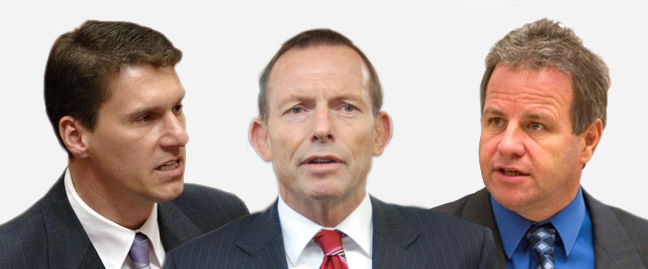Conspiracy theorists and deniers of climate science findings are an influential undercurrent in the Coalition’s contribution to the carbon price debate. [27 September 2011 | Peter Boyer]

South Australian Senator Cory Bernardi (L) and Western Australian MP Dennis Jensen (R) with Tony Abbott (Composite image)
Nearly two years ago, just before Tony Abbott won leadership of his party from Malcolm Turnbull by a single vote, I wrote about the schism that Abbott’s climate-driven challenge had wrought in Liberal ranks.
The Liberal Party, I said, “approaches an election year deeply, bitterly divided over what will become the dominant election issue of our age.”
The past fortnight’s climate debate in Federal Parliament seems to suggest I was wrong — that Tony Abbott’s win-at-any-cost strategy is working, and that the Coalition is focused, disciplined and more united than ever behind a leader whose star continues to rise.
Speaker after speaker from the Opposition side — and there were many of them — spoke as one voice about Julia Gillard’s great lie, about how the government’s proposed carbon pricing system would wreck the economy, and how Australia was going out on a limb ahead of everyone else.
They all sang from the same song-sheet — literally. “Carbon tax legislation talking points” is a 34-page list of how to attack the government’s “Clean Energy Future” package. It was headed “Coalition in confidence”, but somehow a faxed copy found its way into the public domain.
In summary, it says that a continually-rising carbon tax will put more pressure on the cost of living in tough times with no environmental benefit, unlike the Coalition’s “direct action plan”. In fact, the list does no more than consolidate the Coalition’s oft-repeated anti-tax lines. You have to wonder why it should have been confidential.
But one subject absent from the list was to some Coalition MPs fundamental to the whole deal. They believe the whole debate has been founded on an untruth — on “the lies and the disingenuous statements that have been peddled by people who seek to profit from this whole climate change hysteria”, as Adelaide-based Senator Cory Bernardi told last week’s Four Corners program. Bernardi is not without influence in the Coalition — as Shadow Parliamentary Secretary Assisting the Leader of the Opposition he has unique access to the ear of his leader.
The “paid mouthpieces of the government”, as Bernardi calls CSIRO climate scientists (or most of them — “there may be some exceptions”, he says), peddle false science because they get a financial reward for it. For him, it seems, the whole question of climate change is down to one thing: money.
We have yet to hear Bernardi speak on this legislation because it hasn’t yet reached the Senate, but last week we heard from Perth-based MP Dr Dennis Jensen. He began his address by pointing out that he was “the only PhD qualified scientist in this parliament”.
“I do not accept the premise of anthropogenic climate change,” said Jensen. “I do not accept that we are causing significant global warming and I reject the findings of the IPCC and its local scientific affiliates.”
After a preliminary dig at excessive living by Al Gore and Tim Flannery, Jensen outlined why he thought the widely-accepted view on climate was wrong.
There was the “reality” of global cooling since 1998 (contrary to what the custodians of all global records are saying). There was what Jensen saw as doctoring of weather data for Darwin by CSIRO and Bureau of Meteorology scientists, allegedly to change the city’s temperature trajectory from long-term cooling into warming.
There were allegations that science had failed to track global energy, that discrepancies existed between observed rainfall and model predictions, that the globe’s ocean temperatures were falling, and that sea level rise was stalling, with Pacific islands not decreasing but increasing in area.
“What we see,” declared Jensen, “is that the peer reviewed science is not anywhere near as solid as those opposite suggest.”
Jensen’s charges are not new. They have surfaced and re-surfaced over the years. Some have appeared to hold weight, only to be found wanting in the peer-review process. Others were never more than a good story or a baseless conspiracy theory.
Jensen is right to say that the science behind climate change is not settled, and his scientific training and experience would give him a better handle on the scientific method than your average MP.
But he’s only right in the sense that science is never “settled”. It can’t prove ideas; its method is to test them endlessly, by observing, measuring and experimenting. And Jensen’s PhD is in ceramics engineering, not in any field directly concerned with climate change.
Jensen wasn’t alone in his sentiments. Luke Simpkins and Craig Kelly (both from NSW) were among Coalition MPs ridiculing the whole idea of carbon pollution — “champagne is just chardonnay infused with carbon pollution,” said Kelly. To Bob Baldwin (also NSW) the whole deal was part of Gillard’s “socialist” agenda.
In his opening remarks on the legislation, Tony Abbott stuck to the Coalition hymn-sheet and didn’t address such potentially sticky things as the science behind global warming. But he didn’t need to. His weasel-words on Four Corners said all that needed to be said about how he regards scientists, their institutions and their expressed findings: “The CSIRO obviously has a position; it’s a position that it argues for in good faith, and good luck to them”. To Abbott, this is not a matter of science, but of opinion.
Tony Abbott’s Coalition has the stated belief that while humans influence climate a tax is the wrong remedy. For many Coalition members, including Abbott, there’s another, unwritten one: that it’s all a scam and the world is in thrall to fraudulent, money-grubbing scientists and their political masters.
And these people may be headed for government.
